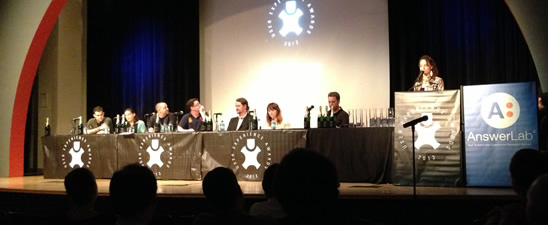
The 3rd annual UX Awards took place on May 21, 2013 in New York City (see Figures 1-5). I had the pleasure of interviewing Beverly May, UX Awards founder, to learn what inspired her to start the awards, how she went about doing so, and what she’s learned from the experience.
Mindy Maxwell: Please tell us a little bit about yourself and your background.
Beverly May: I’m an Internet 1.0 veteran with a broad foundation spanning graphic design, web and software development, project management, business analysis, and every role in between. I’ve worked at a wide range of companies: startups, agencies, software shops, publishing houses, and government agencies. I went to the Interactive Telecommunications Program at Tisch, New York University. A few years later, after finishing business school at Oxford University, I founded my own UX and product strategy consultancy, Oxford Technology Ventures (OTV), in NYC in late 2008. Before I got into the web, I worked as a music promoter and started a music promotions and production company when I was twenty. Putting on large-scale, highly orchestrated events is something I am very, very familiar with.
MM: What inspired you to start the UX Awards?
BM: I had the idea for the Awards in 2009, but didn’t really pursue it seriously until 2011. I felt there was still confusion about what UX was, as well as skepticism from both business leads and technologists about the value of UX. The UX Awards event was created to help address this confusion by articulating the value and importance of UX through clear best-in-class examples, and by providing top industry practitioners as panelists. The initial main goal was to help legitimize and evangelize UX to the broader tech and business community, while a secondary aim was to celebrate and provide leadership within the UX community.
Three years later, I think the value of UX has finally been understood more broadly, with the success of such high-profile startups like Pinterest, Tumblr, and Kayak. These companies’ successes are based almost entirely on user experience. With UX as a concept becoming more understood and definitely more valued, I believe the role of the UX Awards has shifted to focus more on professional and industry thought leadership: best testing practices, cutting edge trends, case studies, and so on. It’s our night and our celebration, and it should be an event we all find both inspiring and stimulating.
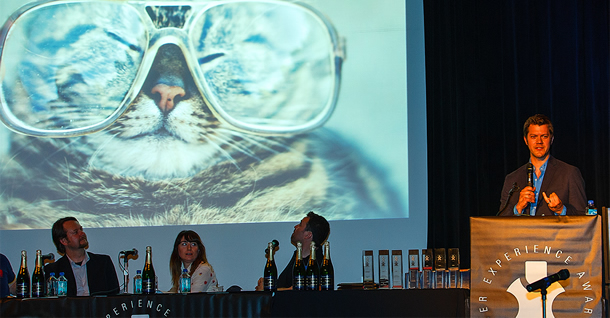
MM: How did you go about founding the event?
BM: I reached out to the New York chapters of UXPA and IXDA and asked if there was interest in a collaborative awards event along with NYC-CHI. I have always felt that the Awards needs to represent the entire UX community and be viewed as a fair, transparent, and credible event that reflects the range of our communities’ abilities and showcases truly outstanding work. Each organization was represented on the jury. The first year we were still fairly collaborative and open in terms of how we might judge entries and manage the event. Now, it’s a more streamlined process since we’ve worked out a lot of the kinks and hurdles and have a clearer mission.
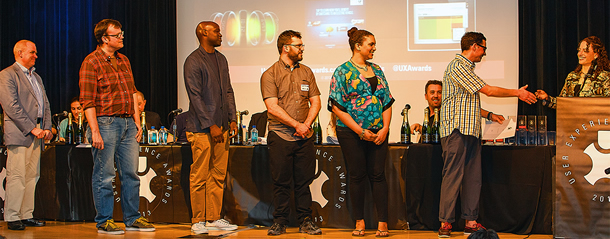
MM: What kind of challenges have you encountered when organizing the event?
BM: There are challenges every year: balancing juror representation, managing sponsor requests and needs, recruiting sponsors, raising awareness outside of NYC, recruiting submissions, promoting the event, and paying for the event. There are also all of the last-minute details, such as coordinating winning submission videos and presentation assets and planning the event reception.
One of our biggest challenges is a perception that UX Awards is a NYC-only event. To have the event be relevant, it can’t be simply NYC-centric, even if the actual Awards are held there. We promoted the event heavily at SXSW these past two years and held a special SXSW Meetup this year. We’ve also promoted the event at IXDA’s Interaction 2013 and IA Summit 2013. We are considering making the event bicoastal, such as one year in San Francisco, one year in NYC. In the future, we might align ourselves with a broader UX organization, too. We’ve made progress in changing the perception of the Awards as being a NYC-only event, but we need even more global awareness to really have the desired impact.
MM: Can you share any lessons learned?
BM: The UX audience is incredibly critical and tends to be focused on each tree in the forest. This isn’t surprising given that our professional role is to analyze something and determine how it could be better. It’s hard for many of us to be enthusiastic when we see even minor flaws and to recognize them in context. The same applies to the Awards. The Awards are there to help celebrate accomplishments. No project, even the Grand Prize winners, is perfect. We need to learn to couch our criticism and recommendations in context.
MM: In your opinion, have the Awards been a success?
BM: I think the 2013 Awards were successful. The event had a good flow, positive feedback, high-caliber jurors, and high-caliber submissions and winners. This is the first year that I really felt like it came together and was what it should be as an event. The first two years were decent in context, but like any project, we needed to iterate to get to where it needed to be.
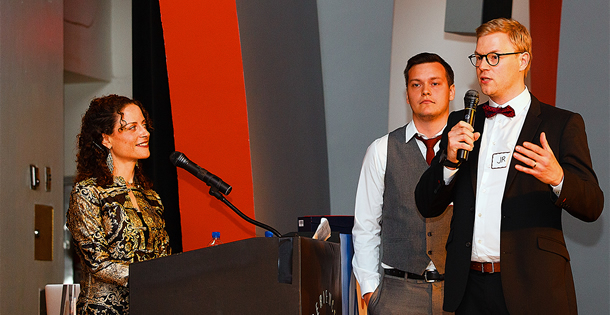
MM: What do you think the Awards reveal about the current state of UX?
BM: Each year a theme emerges from submissions that reflects the state of the industry and current trends. 2013 revealed our march towards ubiquitous computing with winning projects in areas like electric car customization and management, home automation devices, digital prosthetics, and mobile voice- and touch-enabled software. It’s an interesting time to be in UX if you understand UX to be any kind of digital input experience that will increasingly extend beyond a screen or graphical layout.
MM: So, what’s next?
BM: We’re wrapping up UX Awards 2013 and already in the early planning stages of the 2014 event. If you’re interested in sponsoring or getting involved, please get in touch! You can also follow the Awards on Twitter @UXAwards, or join our mailing list at UserExperienceAwards.com.
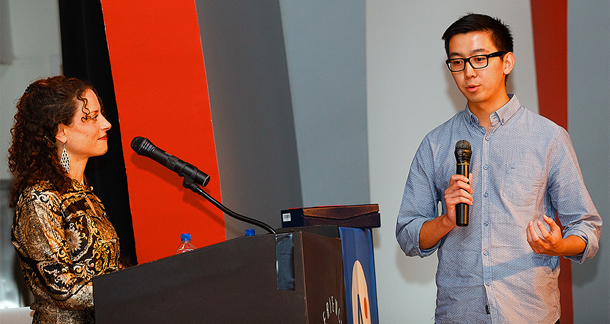
[bluebox]
2013 UXAwards Winners
- GRAND PRIZE for Best Everyday Utility: Google Now by Google
- GOLD for Best Digital Media Transformation: Helsingin Sanomat Digital Transformation by Cava Interactive for Helsingin Sanomat
- GOLD for Best Social Learning Platform: Actively Learn by Schema Design, LLC for Actively Learn, Inc.
- SILVER for Best Accessibility Innovation: Activ by students at Virginia Tech
- SILVER for Best Consumer Device: WeMo by Belkin
- SILVER for Best UX Research Process: Cessna – We Have Your Jet by Digitas for Cessna
- SILVER for Most Useful Consumer Health Care Service: ZocDoc by ZocDoc
- BRONZE for Most Persuasive Use of Data: Water For People by EffectiveUI for Water for People
- BRONZE for Best Clinical Healthcare Experience: PowerChart Touch by Cerner Corporation
- BRONZE for Best Classroom Learning Experience: Amplify Tablet by Amplify
FINALISTS:
- USAToday.com site redesign by Fi for Gannett
- PUMA Joypad Wall by kbs+ Spies & Assassins for PUMA
- BMW ActiveE by kbs+ Spies & Assassins for BMW North America
- American Express Consumer Digital Acquisition Journey by Huge for American Express
- Nike+ FuelBand by R/GA for Nike
- RealSpend by SAP
[/bluebox]第三届年度 UX 颁奖大会向我们揭晓了 UX 领域的翘楚。今年的获奖者主要集中在日常生活设备的泛在计算领域。
第三届年度 UX 颁奖大会于 2013 年 5 月 21 日在纽约市举行。在本文中,Mindy Maxwell 将分享对 UX 奖项创立者 Beverly May 的访谈记录,探讨 Beverly 发起此奖项的原因,她是如何着手其相关工作的,以及从中有何领会。2013 年 UX 颁奖大会以泛在计算为主题,获奖项目涉及电动汽车定制和管理、家庭自动化设备、数码义肢及移动语音与触摸支持软件领域。
文章全文为英文版3회를 맞는 연례 UX 어워즈가 최고의 UX를 가려냅니다. 올해의 우승자는 일상생활에까지 손길을 뻗친 기기를 활용한 유비쿼터스 컴퓨팅에 초점을 두었습니다.
제3회 연례 UX 어워즈는 2013년 5월 21일 뉴욕 시에서 개최되었습니다. 본 기사에서는 Mindy Maxwell이 UX 어워즈 창립자인 Beverly May와 가진 인터뷰를 소개합니다. Beverly가 이러한 어워즈를 시작하게 된 영감의 원천은 무엇이고, 어떻게 시작하게 되었고, 또 그러한 경험을 통해 얻은 것은 무엇인지 알아봅니다. 2013년 UX 어워즈는 전기차 주문 제작 및 관리, 홈 오토메이션 기기, 디지털 보철술 및 모바일 보이스, 터치 작동형 소프트웨어 같은 분야를 다룬 우승 프로젝트를 통해 유비쿼터스 컴퓨팅이라는 주제를 선보였습니다.
전체 기사는 영어로만 제공됩니다.O 3º UX Awards anual mostrou o melhor na área de experiência do usuário. Os vencedores deste ano enfocaram a computação ubíqua com dispositivos utilizados no dia a dia.
O 3º UX Awards anual ocorreu em 21 de maio de 2013, em Nova York. Neste artigo, Mindy Maxwell compartilha uma entrevista com Beverly May, fundadora do UX Awards, para saber o que a inspirou a criar esta premiação, o que ela fez para concretizá-la e o que aprendeu com essa experiência. O 2013 UX Awards destacou o tema de computação ubíqua com projetos vencedores em áreas como personalização e gerenciamento de carros elétricos, dispositivos de automatização doméstica, próteses digitais, e softwares para dispositivos móveis ativados por voz e por toque.
O artigo completo está disponível somente em inglês第三回UX賞の授賞式で、優れたUXが一同にスポットライトを浴びた。今年度の受賞者たちは、日常生活に定着したデバイスを使った「ユビキタス・コンピューティング」に注目している。
第3回UX賞授賞式がニューヨーク市で2013年5月21日に行われたが、この記事では、UX賞の創設者であるBeverly Mayが賞をスタートさせることになったきっかけ、創設までの足取り、その経験から学んだことについて語ったインタビューを、Mindy Maxwellが紹介している。2013年度UX賞授賞式では、電気自動車のカスタム化や管理、ホームオートメーション機器、デジタル補綴(義肢など)、音声とタッチ式の双方で操作できるモバイル用ソフトウェアなどのエリアで、ユビキタス・コンピューティングをテーマとした受賞プロジェクトが発表された。
原文は英語だけになりますLa 3ra entrega anual de los Premios UX presenta lo mejor de la experiencia de usuario. Los ganadores de este año se enfocaron en computación ubicua con dispositivos que forman parte de la vida diaria.
La 3ra entrega anual de los Premios UX se llevó a cabo el 21 de mayo de 2013 en Nueva York. En este artículo, Mindy Maxwell presenta una entrevista con Beverly May, la fundadora de los Premios UX, para conocer qué inspiró a Beverly a crear los premios, cómo lo hizo y qué aprendió de esa experiencia. La entrega de los Premios UX de 2013 reveló una temática de computación ubicua con proyectos ganadores en áreas como personalización y administración de automóviles eléctricos, dispositivos de automatización para el hogar, prótesis digitales y software con control de voz y tacto para dispositivos móviles.
La versión completa de este artículo está sólo disponible en inglés


